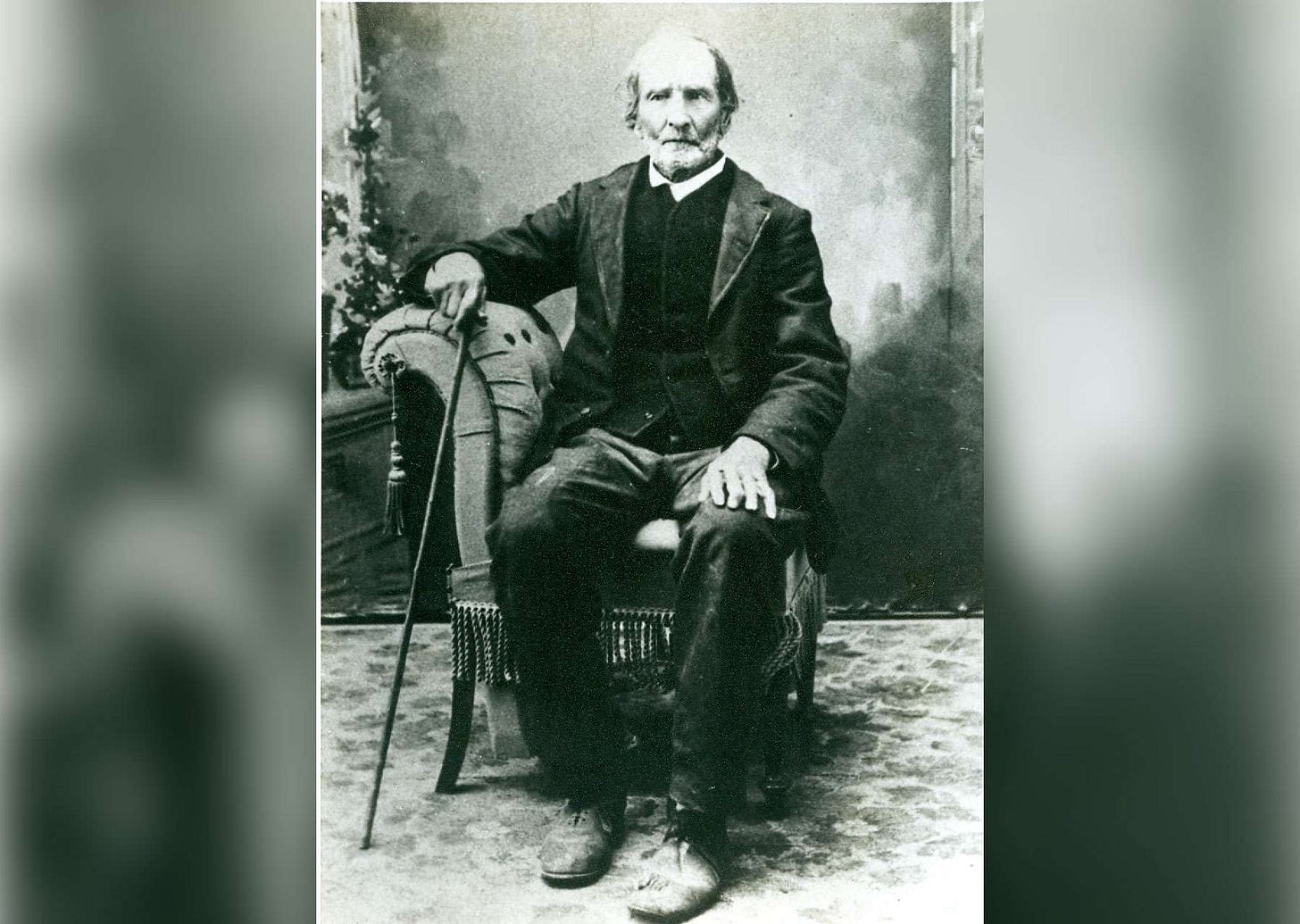You’re reading “Echoes in Time,” a weekly newsletter by the Independent Herald that focuses on stories of years gone by in order to paint a portrait of Scott County and its people. “Echoes in Time” is one of six weekly newsletters published by the IH. You can adjust your subscription settings to include as many or as few of these newsletters as you want. If you aren’t a subscriber, please consider doing so. It’s free!
Today’s newsletter is sponsored by the Scott County Chamber of Commerce. Since 1954, the Scott County Chamber of Commerce has advocated for a strong community by supporting stronger infrastructure and leadership.
The story of Scott County’s first sheriff, John Lewallen
Scott County’s first sheriff was a North Carolinian of Welsh descent, John Lewallen, who served as the county’s top lawman for four terms before moving to Texas, where he lived out the last years of his life.
Although settlement in what would eventually become Scott County began around 1800, this county was initially part of Anderson County — then Campbell, Morgan and even Fentress counties as they were created. (Campbell County was created in 1806, Morgan County was created in 1817, and Fentress County was created in 1823.)
In 1849, the Tennessee General Assembly carved out parts of Campbell, Anderson, Morgan and Fentress counties and created Scott County, which was named after War of 1812 hero Gen. Winfield Scott. With the creation of the new county came a need for its people to elect officials to lead it, and the first election was held in 1850.
John Lewallen — sometimes spelled Llewellyn, which was a variation of the surname that was used by prior generations of his family — was the man elected Scott County’s first sheriff. In those days, sheriffs served two-year terms. Lewallen completed his first term and was re-elected in 1852, then re-elected again in 1854. And while Tennessee would eventually implement term limits for sheriffs, allowing them to serve no more than three terms in office, those term limits weren’t in place in the 1850s. So Lewallen was elected to a fourth term in 1856.
Although not mentioned as frequently or prominently as families like Lowe and Chitwood, the Lewallens were among the first families to settle this frontier land that would become Scott County. The Lowes settled on Smokey Creek on what is now the east side of Scott County, the Chitwoods settled at Winfield on the north side, the Slavens settled at No Business Creek on the west side, and the Lewallens settled along Wolf Creek on the south end. There were others, too, of course.
It was Anderson Grant Lewallen (1764-1829) and his wife, Lucy Rice (1766-1832), who were the first Lewallens to come to present-day Scott County. They were originally from Virginia; they married in Prince Edward on June 8, 1784 and had eight children.
Anderson Lewallen was of Welsh descent. In fact, his ancestors had quite a storied history in Wales. His father was Daniel Richard Llewellyn, his grandfather was Daniel Alexander Llewellyn, and his great-grandfather was Daniel Llewellyn Sr.
It was Anderson Lewallen’s great-grandfather who was the last generation of Lewallens to live in Europe. He was born in Essex, England around 1600 and sailed to the Americas as an adult, landing in Virginia colony. The first record of him in America comes in 1642, when he patented 856 acres of land on Turkey Island Creek.
Daniel Llewellyn Sr. was a leader in his community, serving as a justice of the peace, a militia captain, and in the Virginia House of Burgesses — the first democratically-elected legislative body in the British American colonies and a precursor to the modern-day U.S. Congress.
Anderson Lewallen’s grandfather, Daniel Alexander Llewellyn, inherited more than 600 acres of land when his parents died. Like his father, he was a captain in the militia. He spent his entire life in Charles City, Va., and died there in 1712.
It’s not entirely clear when Anderson and Lucy Lewallen arrived in present-day Scott County. Anderson Lewallen is listed in a 1785 census as living in Prince Edward, Va., as did two of his brothers. They later moved to Wake County, N.C., which is where some of their children were born.
The move to the Cumberlands had probably occurred by the time the War of 1812 began. One of Anderson and Lucy’s children, Andrew Leutian Lewallen, married his wife, Malinda Davis, in Kingston in 1814, and fought under Gen. Andrew Jackson at the Battle of New Orleans in January 1815.
Anderson Lewallen died in 1829 and Lucy died in 1832. They’re buried in a small cemetery on Wolf Creek in unmaintained graves.
It was in 1812 that John Lewallen — Anderson and Lucy’s youngest child — was born. The family was likely living in present-day Scott County by that time.
Andrew Lewallen — John’s older brother who fought under Jackson in the War of 1812 — settled on Nydeck Road and was a prominent landowner there. He is buried at Carpenter Cemetery there. He and his wife, Malinda, had six children. Their three daughters all married brothers from the Young family that lived at Glenmary and are buried at Campground Cemetery near Coal Hill.
It isn’t known what happened to some of the other Lewallen siblings. One of them, however, was Joel Lewallen, who settled on Brimstone Creek. He’s buried at the Hughett Cemetery there. He married Rachel Taylor and they had six children. One of them, Vicey, married Jacob Lawson and started the Lawson family of Bull Creek. Another, Christena, married John Hughett and was the father of Sheriff Frank Hughett and Scott County School Superintendent Jasper Hughett. Her husband served as a justice of the peace in Scott County for 44 years.
Then there was the baby of the family, John Lewallen. He married Delilah Reed (1815-1865) in 1833. She was the daughter of Isaac and Phariba Hatfield Reed, another of Scott County’s earliest families. Isaac Reed was on the committee that chose Huntsville as Scott County’s seat of government in 1850, and was elected Scott County’s first trustee in the same March 1850 election that saw his son-in-law elected sheriff.
John and Delilah had 10 children: Isaac James, Anderson, Elizabeth, Campbell County, Andrew, Nancy, Columbus Scott, Louisa, Lucinda and Harry.
When Delilah Lewallen died in 1865 (she’s buried at Reed Cemetery at New River), John married her sister, Melinda Reed. She had been married to Sterling McDonald, the son of Revolutionary War veteran James McDonald, who died in 1863 and is buried at Huntsville Cemetery. John and Melinda had two more children: Tennessee and Texas.
It was at some point after 1868 that John and Melinda left Scott County for Texas. John died in 1896 and Melinda died in 1907. They’re both buried at a cemetery in Bradshaw, Tex.
Meanwhile, Lewallen’s successor as sheriff was Bailey Buttram, who took office in 1858 and served until 1864. Buttram’s tenure as sheriff included the challenges of secession and the lawlessness and guerrilla warfare that followed during the Civil War. He had the task of carrying the results of Scott County’s secession vote — voters here rejected secession by the largest margin of any county in Tennessee — to the state capital in Nashville in June 1861.
Lewallen’s nephew, Frank Hughett, served as sheriff from 1888 to 1894, and again from 1898 to 1900. Interestingly, most of Scott County’s early sheriffs were from the Robbins area or New River. Lewallen was from Glenmary, Hughett was from Brimstone, while Buttram, Rueben Hurtt (1876-1882) and Beaty Cecil (1882-1886) were all from New River. John Goad (1894-1896) was also from Brimstone. So from 1850 to 1900, the only sheriffs of Scott County not from New River or further south were James Sharp (1864-1870, Winfield), W. Terry (1870-1872) and Milton Terry (1872-1874, Oneida).
Thank you for reading. Our next newsletters will be Threads of Life on Wednesday and The Weekender Thursday evening. Want to update your subscription to add or subtract these newsletters? Do so here. Need to subscribe? Enter your email address below!
◼️ Monday morning: The Daybreaker (news & the week ahead)
◼️ Tuesday: Echoes in Time (stories of our history)
◼️ Wednesday: Threads of Life (obituaries)
◼️ Thursday evening: The Weekender (news & the weekend)
◼️ Friday: Friday Features (beyond the news)
◼️ Sunday: Varsity (a weekly sports recap)





I'm a descendant of Joel, John's brother and have been trying to do genealogy on the line, never really getting past Anderson. This is amazing and I'd love to know the how the information on their line, all the way back to Europe, was established. Can you point me in the right direction? Thank you for this article!